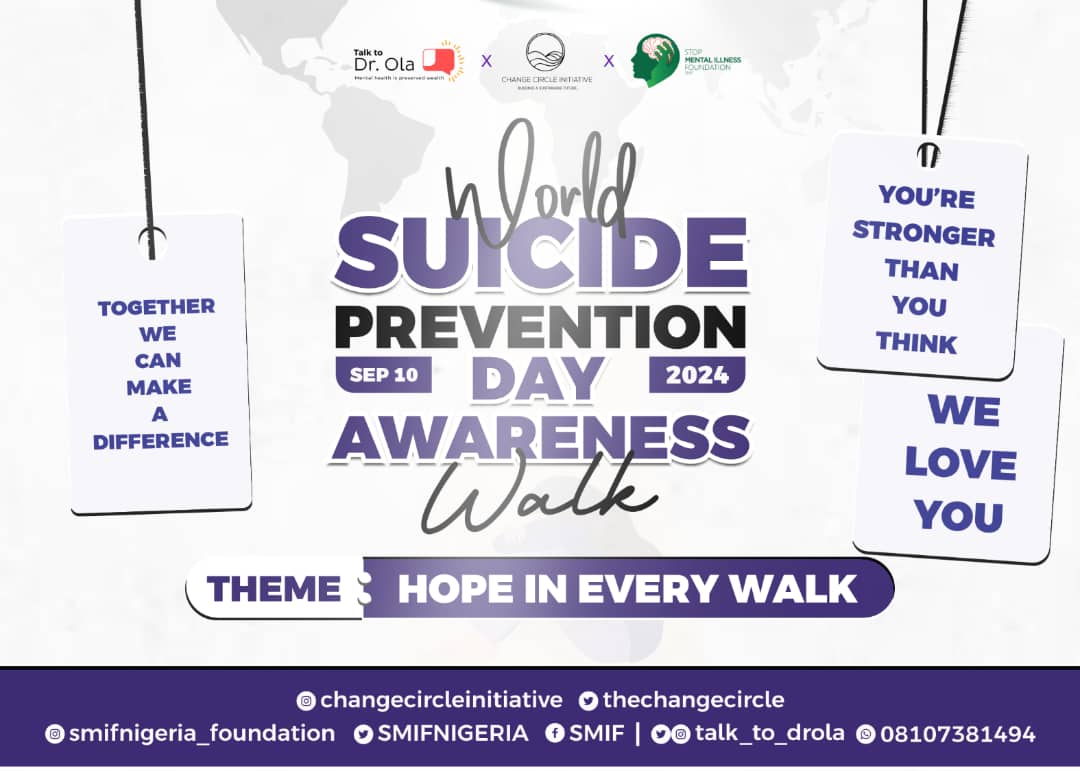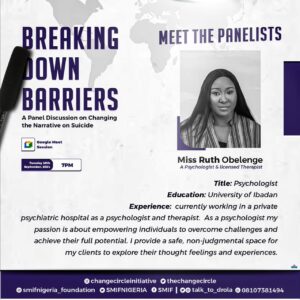
World Suicide Prevention Day: Addressing the Crisis in Nigeria

Understanding the Crisis
September 10 marks World Suicide Prevention Day, a day dedicated to raising awareness about suicide and its prevention. In Nigeria, the issue is particularly pressing. Recent studies indicate that suicide rates are on the rise, with a 2021 report from the World Health Organisation (WHO) estimating that Nigeria’s suicide rate is approximately 9.3 per 100,000 people. This statistic, while lower than global averages, does not capture the full extent of the crisis, particularly among vulnerable populations such as youths and those facing socioeconomic challenges.
Quantitative Research: The Numbers Speak
A comprehensive study conducted by the Nigerian Bureau of Statistics in 2022 revealed some alarming trends:
Age Demographics: The most affected age group is between 15 and 29 years, accounting for over 50% of reported suicide cases.
Gender Disparity: While both men and women are affected, men are about 1.7 times more likely to die by suicide.
Urban vs. Rural: Suicide rates are notably higher in urban areas, where the pressures of modern life and social isolation can exacerbate mental health issues.
These statistics underline the need for targeted interventions and greater awareness of mental health challenges across the nation.
Qualitative Research: Understanding the Causes
Qualitative research, including interviews and focus groups with mental health professionals and individuals affected by mental illness, reveals deeper insights into the causes of suicide in Nigeria:
1. Stigma and Lack of Awareness: Many individuals with mental health issues face stigma, leading them to avoid seeking help. Cultural beliefs often equate mental illness with personal failure or spiritual problems.
2. Economic Hardship: The ongoing economic challenges in Nigeria, including unemployment and poverty, contribute to feelings of hopelessness, particularly among young people.
3. Access to Mental Health Resources: There is a significant shortage of mental health professionals and facilities. According to WHO, Nigeria has only 0.2 psychiatrists per 100,000 people, which severely limits access to care.
4. Impact of Social Media: While social media can offer support, it can also exacerbate feelings of inadequacy and loneliness, particularly among youth.
Prevention Strategies: The Role of the Stop Mental Illness Foundation
The Stop Mental Illness Foundation (SMIF) is committed to combating suicide in Nigeria through a multifaceted approach:
- Awareness Campaigns: SMIF runs nationwide campaigns to educate the public about mental health issues, aiming to reduce stigma and encourage individuals to seek help.
- Support Groups: We facilitate support groups that offer safe spaces for individuals to share their experiences and feelings, promoting community support and connection.
- Training for Health Professionals: We provide training for healthcare workers to better equip them to identify and treat mental health issues, ensuring that more individuals receive the care they need.
- Collaborations with Schools: Recognising that many young people struggle with mental health, SMIF collaborates with educational institutions to implement mental health programs and resources in schools.
- Crisis Intervention Services: SMIF has established a helpline that provides immediate support to individuals in crisis, helping to connect them with mental health professionals.
This year, in collaboration with Dr. Ola and the Change Circle Initiative, the Stop Mental Illness Foundation invites you to come together to break down the barriers surrounding mental health and suicide.
On this World Suicide Prevention Day, it is crucial to remember that every life lost to suicide is a tragedy that impacts families and communities. By raising awareness, providing resources, and fostering an environment of support, we can make a difference. The Stop Mental Illness Foundation is dedicated to working towards a future where mental health is prioritized, and individuals feel empowered to seek help. Together, we can combat suicide in Nigeria and create a society that values mental well-being for all.
If you or someone you know is struggling, please reach out to a mental health professional or contact our helpline for support. You are not alone; help is available.
